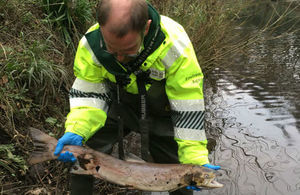Salmon found in River Don at Sheffield
An adult salmon has been found in the River Don at Salmon Pastures confirming the species’ return to Sheffield city centre after an absence of 150 years.

Fisheries officer Jerome Masters with the salmon at the River Don in Sheffield
The body of the 79cm (31 inches) salmon was reported to the Environment Agency by a member of the public on Wednesday 2 January. It appears to have died from natural causes.
Coincidentally, January marked the beginning of the International Year of the Salmon, an initiative to support the conservation and restoration of wild salmon species.
Following the recent push to improve water quality and introduce more fish passes to facilitate the migration of our native fish, the re-colonisation of salmon in the Don is now becoming a reality.
The Environment Agency’s partnerships with the Don Catchment River Trust, Yorkshire Water, Canal and River Trust and Sheffield City Council has introduced multiple new fish passes. These allow fish to move along the river, easing their migration past weirs. The route is only two weirs away from a ‘fish highway’ between the sea and salmon spawning grounds. The penultimate pass, at Sanderson’s Weir, is expected to be completed within the next year.
Jerome Masters Environment Agency Fisheries Technical Specialist said:
Although this individual reached the centre of Sheffield, the final two fish passes are still needed in order to re-establish a spawning population.
Adult salmon do not feed when they enter rivers from the sea and so have only the energy reserves stored in their body to with which to propel them upstream and enable them to spawn successfully.
Salmon only leap when they have to and prefer to swim past obstructions when they have the option. Leaping risks injury and as many attempts are often needed ‘drains the fish’s batteries’ before they reach their spawning grounds.
Examination by Environment Agency fisheries specialists confirmed the female fish had recently spawned. Salmon often die after spawning, consequently, there is no reason to suspect anything other than a natural cause of death. Prior to spawning, the fish probably weighed between 10 to 12 lbs (4.5 to 5.5 kg).
Growth patterns in the scales showed the salmon spent two years in freshwater before spending two years at sea. Most salmon return home to the river where they were born, but some will stray up the ‘wrong’ river. This is how they can recolonise rivers where they may have become locally extinct, such as the River Don.
Ben Gillespie, Yorkshire Water’s lead environmental advisor said:
The confirmation of salmon in Sheffield demonstrates our investment in fish passes on the Don is working.
These projects have been delivered in partnership with the Environment Agency and DCRT who have shared their technical expertise to ensure we maximise environmental benefits. I’m excited for what the future holds!
Ed Shaw Don Catchments River Trust’s director said:
The Don Catchment Rivers Trust, the Environment Agency, and others have put a lot of effort into installing fish passes on weirs to enable salmon to return to the Don, so this record of a migrating adult being found in Sheffield is really exciting news.
In 2016 the DCRT built fish passage enhancements on five weirs in Sheffield as part of our Living Heritage of the River Don project, and now there is almost a complete migratory route for salmon up to the first potential spawning habitat in Sheffield. Masbrough Weir will soon be the one remaining obstacle to migration, but in partnership with the Environment Agency we have recently had the designs done for a fish pass on this weir.